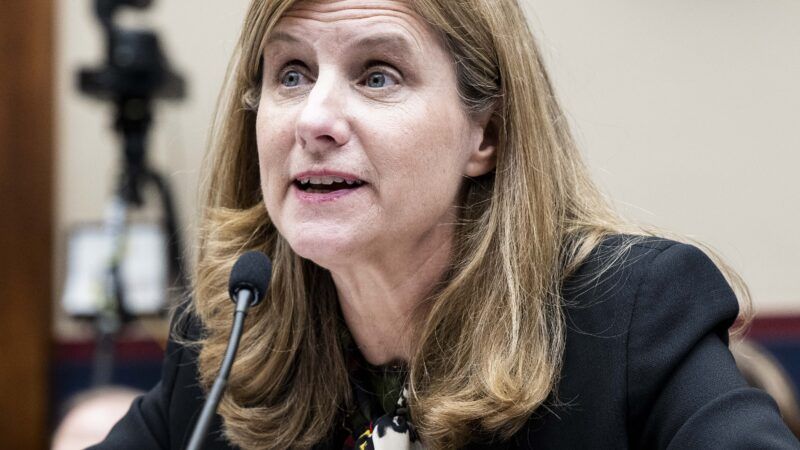Congress Shouldn't Encourage College Presidents To Censor Even More Speech
Both pro-Israel and pro-Palestinian activism has been suppressed on campuses.

On Tuesday, the presidents of Harvard University, the Massachusetts Institute of Technology (MIT), and the University of Pennsylvania appeared before the House of Representatives to answer questions about antisemitism on campus. They were very much of the when-did-you-stop-beating-your-wife variety.
Rep. Elise Stefanik (R–N.Y.) repeatedly demanded that Harvard's Claudine Gay, MIT's Sally Kornbluth, and UPenn's Elizabeth Magill give "yes or no" responses to complicated questions about whether calls for genocide against Jews would violate university policies. The presidents consistently explained that their answers were context-dependent; it mattered whether the speech was directed at specific individuals, whether it was severe and pervasive, and whether it was accompanied by prohibited conduct.
These answers outraged Stefanik and her legislative colleagues.
"This is the easiest question to answer yes," Stefanik thundered.
Rep. Jim Banks (R–Ind.) was similarly furious that UPenn had invited antisemitic speakers to a pro-Palestinian rights literature festival. Magill clarified that she had issued a statement condemning some of the speakers' remarks, but Banks repeatedly suggested that figures like Roger Waters and Marc Lamont Hill had no business speaking on campus at all. Magill noted that the university's free speech policies are guided by the U.S. Constitution and was promptly ignored.
The antisemitic tenor of pro-Palestinian activism on some campuses is indeed horrifying. National Students for Justice in Palestine did in fact celebrate the October 7 terrorist attacks. So did individual chapters of Black Lives Matter and the Democratic Socialists of America. These were disgusting displays. No one should make excuses for, let alone endorse, Hamas's brutal campaign of murder and rape.
But the First Amendment does not make exceptions for hateful speech. It does not prohibit terrorism apologia. It does not forbid implicitly genocidal statements. A university that wishes to model its policies after the U.S. Constitution—an admirable course of action—should allow students and faculty members to make odious statements. The correct response to this speech is for others to criticize it.
If the speech in question is individually targeted, it may lose such protection. Scribbling hateful messages on Jewish students' dormitory room doors, for example, would constitute targeted harassment under the universities' policies. Anti-Israel protests and demonstrations don't count.
It's fair to criticize university administrators for too often abandoning these lofty free speech principles in recent years. Campus authorities have routinely failed to defend free speech when said speech is deemed hateful by some offended party. Hundreds of U.S. campuses erected bias reporting systems, which allowed students to report each other for saying unkind things, even inadvertently. Over the course of the 2010s, universities erected safe spaces and enshrined trigger warnings (which do not work) for the explicit purpose of discouraging supposedly hateful speech.
If critics want to charge that university administrators are hypocrites for only sticking to principle when the scrutinized speech is anti-Jewish, they can do so—but of course, both pro-Palestinian and pro-Israel activism has been suppressed on campuses.
In any case, pressuring university presidents to come down harder on legal speech is not a very good idea. Anyone who has paid close attention to the happenings on college campuses for the last two decades (or more) should be wary of empowering administrators to engage in censorship. Universities do not need any encouragement on that front, least of all from Congress. Hypocrites should be denounced when they fail to protect speech—however odious—not when they stick to the First Amendment.


Show Comments (141)